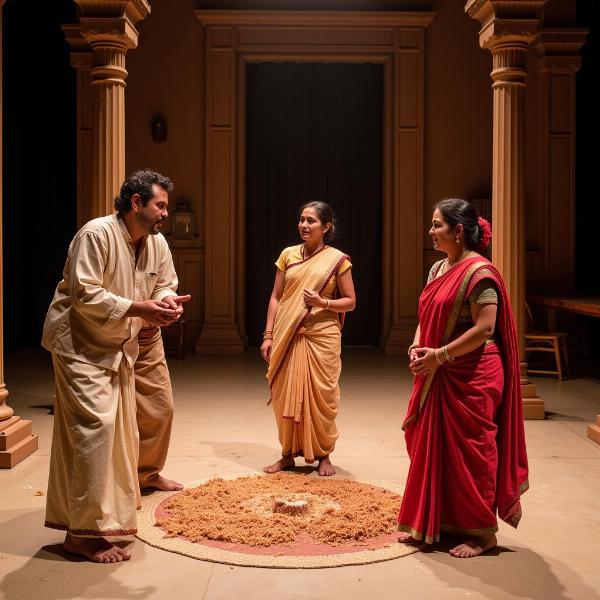The term “ekanki” (एकान्की) holds a special place in Hindi literature and theatre. If you’re curious about the “ekanki meaning in hindi,” you’ve come to the right place. This article will delve into the various facets of “ekanki,” exploring its literal meaning, significance in dramatic arts, and its evolution over time. We’ll also touch upon its key characteristics and provide examples to solidify your understanding.
What Does “Ekanki” Literally Mean?
The word “ekanki” is derived from two Sanskrit words: “ek” (एक) meaning “one” and “ank” (अंक) meaning “act.” Therefore, “ekanki” literally translates to “one-act play.” This concise definition, however, doesn’t fully capture the richness and depth of this dramatic form. It’s more than just a play with a single act; it’s a complete and self-contained narrative delivered within a limited timeframe.
 Ekanki: A One-Act Play in Hindi Theatre
Ekanki: A One-Act Play in Hindi Theatre
“Ekanki” in Hindi Dramatic Arts
“Ekanki” plays a vital role in Hindi theatre, providing a platform for exploring complex themes and emotions within a compact format. They are often used to showcase social issues, explore philosophical concepts, or simply tell a captivating story. Their brevity makes them ideal for amateur theatre groups and educational institutions, while their depth allows for sophisticated storytelling.
Evolution of “Ekanki” in Hindi Literature
Over time, the “ekanki” has evolved, adapting to changing social and cultural landscapes. Initially, they were often based on mythological stories or historical events. However, modern “ekanki” writers have embraced contemporary themes, reflecting the complexities of modern life. This adaptability has ensured the continued relevance and popularity of the “ekanki” in Hindi literature.
Key Characteristics of an “Ekanki”
- Conciseness: “Ekanki” are known for their brevity and focused storytelling.
- Single Act: The entire narrative unfolds within a single, uninterrupted act.
- Limited Characters: Typically, “ekanki” feature a small cast of characters.
- Unity of Theme: A central theme ties the narrative together, providing coherence and depth.
- Impactful Ending: The conclusion of an “ekanki” is often designed to leave a lasting impression on the audience.
Examples of Famous “Ekanki” in Hindi
Several acclaimed writers have contributed to the rich tradition of “ekanki” in Hindi literature. Plays like “Andher Nagari Chaupat Raja” by Bharatendu Harishchandra and “Karbala” by Premchand are prime examples of the genre’s power and versatility.
What are the common themes explored in “Ekanki”?
“Ekanki” often explore themes of social injustice, love, loss, and the human condition. The concise format allows writers to delve deeply into these themes, creating impactful and thought-provoking narratives.
How long does a typical “Ekanki” performance last?
“Ekanki” performances can vary in length but generally last between 30 minutes to an hour. This shorter duration makes them accessible and engaging for audiences of all ages.
Conclusion
“Ekanki,” meaning one-act play, is a significant genre in Hindi literature and theatre. Its concise format, focus on a single theme, and limited characters create a powerful and impactful dramatic experience. From traditional themes to contemporary issues, the “ekanki” continues to evolve and resonate with audiences, making it a vital part of Hindi artistic expression.
FAQ
- What is the literal meaning of “ekanki”? A: It literally means “one-act play.”
- Why are “ekanki” popular in Hindi theatre? A: Their concise format and depth make them ideal for various settings.
- What are some common themes in “ekanki”? A: Social issues, love, loss, and the human condition are often explored.
- How long does an “ekanki” performance usually last? A: Typically between 30 minutes and an hour.
- Where can I find examples of “ekanki”? A: Many libraries and online resources offer collections of Hindi plays.
- Who are some famous “ekanki” writers? A: Bharatendu Harishchandra and Premchand are notable examples.
- Are “ekanki” still relevant today? A: Yes, they continue to adapt and address contemporary issues.
You Might Also Be Interested In:
(No relevant articles found on this site yet.)
About Meaning-Hindi.in
Meaning-Hindi.in is your premier destination for high-quality Hindi translation services. We specialize in a wide range of translation needs, including business and commercial documents, legal and certified translations, technical manuals, website localization, educational and academic materials, and expedited translation services. Our expert team ensures accuracy, cultural sensitivity, and timely delivery for all your translation projects. Need accurate and reliable Hindi translations? Contact us today! Email: [email protected], Phone: +91 11-4502-7584. Meaning-Hindi.in is committed to bridging the language gap and facilitating seamless communication.